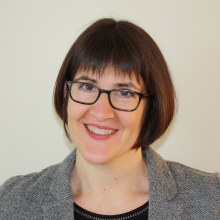June 2018 Federal Policy Fellow Spotlight: Erin Cannon, Ph.D.
2017-2018 Federal Executive Branch Policy Fellow
Be open, explore, take risks, embrace change, reflect, repeat. This has been my mantra for the fellowship year. As a mid-career SRCD policy fellow, the fellowship was an intentional career shift. Trained in developmental psychology, for years I conducted experimental research on the development of social cognition in infants and young children. My work highlighted the importance of early experience. When I learned how socioeconomic status (SES) played a negative role in the child outcomes I investigated, I wanted to devote more effort to thinking about ways we could eliminate SES-related disparities. Thus, I made a move toward applied and policy-related research. I made this shift, and quickly found myself “in the field” and deep “in the weeds.” I applied to the fellowship to come full circle, to broaden my lens, and to learn about how science and policy can best serve vulnerable children and families.
I am an Executive Branch fellow in the Office of Planning, Research, and Evaluation (OPRE) in the Administration for Children and Families (ACF), U.S. Department of Health and Human Services. It has taken almost the entire year for that title to roll off my tongue! I work within the Division of Child and Family Development. OPRE conducts research to inform ACF programs, such as Head Start, Child Care, Child Welfare, Temporary Assistance for Needy Families, Home Visiting, and many others. Informing ACF programs has been a specific interest of mine since I arrived. This happens through the reports we disseminate on our website, but it originates through the process of dialog. Through regular meetings with senior program officials, we exchange information. At OPRE, we work to interpret and explain data that has been collected and analyzed. We also listen carefully to the questions that are asked, as they typically inform future analyses, or develop into our next actionable research projects. Participating in these discussions have been intellectually challenging and exhilarating, but most of all has deepened my understanding of what it means to conduct research for policy.
OPRE also oversees research to push the broader field of human services forward. We identify critical knowledge gaps, and develop research questions to help fill that gap. This is typically done through contracts. We work closely through the lifespan of a research project with a contractor who conducts the work. An example of one of the contracts I contribute to is the National Survey of Early Care and Education, which is the only nationally representative survey of households, providers, and the early childhood workforce focusing on early care and education. It was conducted in 2012 and provides a descriptive summary of the supply and demand for early care and education services for children under the age of 13. It is a treasure trove of information that can be explored for many years. However, as I am often reminded, human services are a moving target. The field, the populations served, and the policy landscape have changed since 2012. This is why it has been especially exciting to help prepare updates to the provider and workforce surveys planned for 2019! The challenge lies in preserving the questions that will allow for comparisons of interest to the 2012 survey, while also collecting information on all of the new questions that have surfaced since then, in an amount of time that a participant is willing to give. Prioritization is key, and is an essential skill, in many ways, in this office!
OPRE also aims to build research capacity, largely through research grants. I serve as the program specialist for the Head Start Scholars grant program, which funds dissertation level research for graduate students doing high quality research of interest to, and in partnership with, Head Start Programs; promotes student-mentor relationships; and fosters collaboration and networking opportunities for these emerging scholars. I have truly enjoyed the entire process of creating a funding opportunity announcement, to directing the grant review panel, and making new awards (still in progress!), and planning grantee meetings. Until now, I was on the receiving end of a grant. It has been very enlightening to learn how grants management activities work from the other side!
I am truly grateful to SRCD and my host office OPRE for this incredible opportunity. Already, it has provided me an entirely new perspective, that I know will serve me well in future endeavors. More importantly, I have gained a perspective that I hope will contribute to increasing opportunities for, and bettering the lives of, young children and their families.
